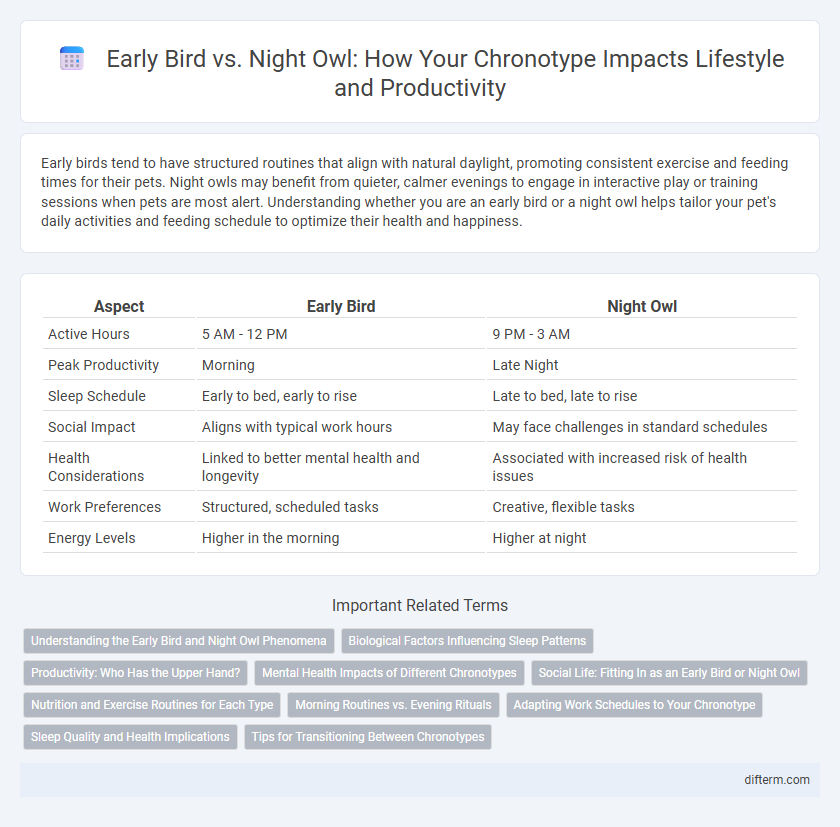Early birds tend to have structured routines that align with natural daylight, promoting consistent exercise and feeding times for their pets. Night owls may benefit from quieter, calmer evenings to engage in interactive play or training sessions when pets are most alert. Understanding whether you are an early bird or a night owl helps tailor your pet's daily activities and feeding schedule to optimize their health and happiness.
Table of Comparison
| Aspect | Early Bird | Night Owl |
|---|---|---|
| Active Hours | 5 AM - 12 PM | 9 PM - 3 AM |
| Peak Productivity | Morning | Late Night |
| Sleep Schedule | Early to bed, early to rise | Late to bed, late to rise |
| Social Impact | Aligns with typical work hours | May face challenges in standard schedules |
| Health Considerations | Linked to better mental health and longevity | Associated with increased risk of health issues |
| Work Preferences | Structured, scheduled tasks | Creative, flexible tasks |
| Energy Levels | Higher in the morning | Higher at night |
Understanding the Early Bird and Night Owl Phenomena
Early birds, also known as morning larks, experience peak cognitive function and energy levels during the early hours, often waking before sunrise and aligning their activities with natural daylight. Night owls exhibit heightened alertness and creativity in the evening, staying active well past traditional bedtime, influenced by delayed circadian rhythms and melatonin production. Understanding these chronotypes helps optimize productivity, mental health, and overall lifestyle by tailoring routines to individual biological clocks.
Biological Factors Influencing Sleep Patterns
Genetic predispositions significantly impact whether a person is an early bird or a night owl, with key genes like PER3 and CLOCK regulating circadian rhythms. Hormonal fluctuations, particularly melatonin secretion timing, influence sleep onset and wakefulness, aligning with natural chronotypes. Environmental cues such as light exposure further modulate these biological factors, reinforcing individual sleep pattern preferences.
Productivity: Who Has the Upper Hand?
Early birds often experience peak productivity in the morning hours when cognitive functions such as attention and memory are highly active, enabling efficient task completion. Night owls tend to excel in creative problem-solving and complex thinking during late hours, aligning with their circadian rhythms that boost brain activity at night. Studies indicate that productivity depends less on the specific wake time and more on aligning work schedules with individual chronotypes to optimize focus and output.
Mental Health Impacts of Different Chronotypes
Early birds generally experience better mental health due to alignment with natural circadian rhythms, resulting in improved mood and lower rates of depression. Night owls often face higher risks of anxiety and mood disorders owing to social jetlag and circadian misalignment. Research highlights the importance of personalized sleep schedules to enhance psychological well-being across different chronotypes.
Social Life: Fitting In as an Early Bird or Night Owl
Early birds often find it easier to align social activities with traditional daytime schedules, promoting consistent interactions during workdays and weekends. Night owls may struggle to participate in morning events but excel in late-night gatherings, fostering deeper connections in nightlife or creative communities. Understanding these patterns helps individuals optimize social engagement and maintain balance in personal relationships.
Nutrition and Exercise Routines for Each Type
Early Birds benefit from consuming a balanced breakfast rich in protein and complex carbohydrates to fuel morning workouts and maintain energy levels throughout the day. Night Owls often perform better with nutrient-dense meals later in the day and may schedule exercise routines in the early evening to align with their peak energy times. Tailoring nutrition timing and exercise sessions to individual circadian rhythms enhances performance and supports metabolic health.
Morning Routines vs. Evening Rituals
Morning routines for early birds often include exposure to natural sunlight, hydration, and focused planning to maximize productivity and mood regulation. Night owls tend to benefit from evening rituals such as dimming lights, mindfulness exercises, and limiting screen time to wind down and improve sleep quality. Tailoring routines to chronotype enhances overall well-being, cognitive function, and energy balance throughout the day.
Adapting Work Schedules to Your Chronotype
Adapting work schedules to your chronotype enhances productivity and well-being by aligning tasks with natural energy peaks; early birds excel in morning-focused activities, while night owls perform better during late hours. Customizing work routines based on circadian rhythms reduces fatigue and improves mental clarity throughout the day. Employers adopting flexible hours see increased employee satisfaction and optimal output aligned with individual biological clocks.
Sleep Quality and Health Implications
Early birds typically experience better sleep quality due to their alignment with natural circadian rhythms, resulting in lower risks of cardiovascular diseases and improved mental health. Night owls often face disrupted sleep patterns, increasing the likelihood of insomnia, metabolic disorders, and mood disorders such as depression and anxiety. Prioritizing consistent sleep schedules and exposure to natural light can mitigate health risks associated with both chronotypes.
Tips for Transitioning Between Chronotypes
Gradually shifting sleep schedules by adjusting bedtime and wake time by 15-30 minutes each day helps align your internal clock with your desired chronotype, whether transitioning from night owl to early bird or vice versa. Exposure to natural morning light and limiting blue light exposure in the evening supports melatonin regulation and eases the adjustment process. Consistent meal times, regular exercise in the morning, and minimizing caffeine intake in the afternoon further reinforce the new sleep-wake pattern and improve overall energy levels.
Early Bird vs Night Owl Infographic

 difterm.com
difterm.com